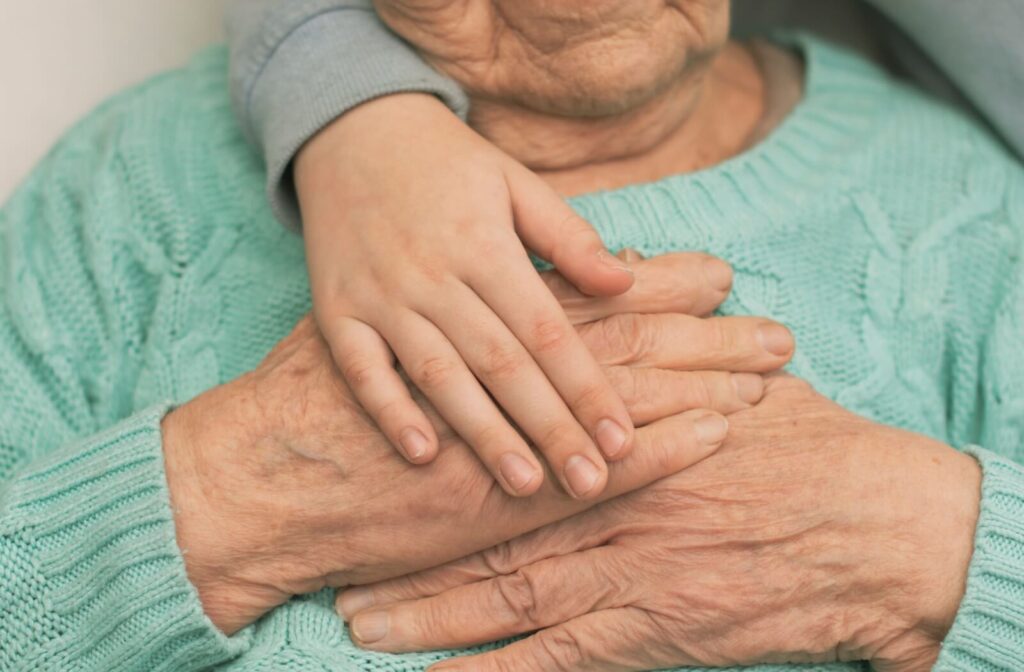Key Takeaways
- Occasional forgetfulness can be a natural part of aging, but persistent memory loss may point to dementia.
- Dementia affects daily living, while normal aging typically does not.
- A professional evaluation is crucial when warning signs appear.
- Supportive memory care communities provide specialized programs to help people with dementia maintain dignity and quality of life.
When a loved one begins to show changes in memory or behavior, it’s natural to wonder whether what you’re seeing is simply a part of getting older or a sign of something more serious. The difference is that normal aging involves minor, occasional lapses, while early dementia is marked by consistent memory loss and cognitive changes that interfere with daily life.
Understanding this distinction helps families recognize when to be reassured and when to take action. Forgetting a word in conversation or misplacing keys may be frustrating, but these are often expected age-related changes. On the other hand, repeating the same questions, struggling with familiar tasks, or becoming disoriented in well-known places may be early signs of dementia.
By learning more about the signs of dementia, you can better support your loved one’s health, help them access memory care if necessary, and plan for the future with confidence.
What Are Normal Age-Related Changes in Memory and Thinking?
Aging naturally brings changes to the body and brain. Just as joints may stiffen or eyesight may blur, the brain can also slow down. These shifts don’t necessarily mean dementia — they are often part of the normal aging process.
Some examples of normal age-related changes include:
- Occasionally forgetting names or appointments but remembering them later.
- Needing more time to learn something new or process information.
- Sometimes losing track of items like glasses or keys.
- Feeling momentarily distracted or forgetting a word in conversation.
These experiences, while inconvenient, usually don’t disrupt daily routines or independence. Seniors who experience them can still cook meals, manage finances, hold conversations, and live safely on their own.
It’s important to note that healthy lifestyle choices—such as staying physically active, eating a balanced diet, and engaging in social activities—can support brain health and reduce the impact of age-related decline.
What Signs May Indicate Early Dementia?
Unlike the expected changes of normal aging, dementia symptoms are persistent, progressive, and disruptive to everyday life. Dementia is not a single condition but a group of disorders, including Alzheimer’s disease, that affect memory, reasoning, and behavior.
Warning signs that may indicate early dementia include:
- Asking the same questions repeatedly or forgetting recent conversations.
- Difficulty following familiar routines, such as cooking a regular meal or paying bills.
- Confusion about time, dates, or places.
- Trouble finding the right words or maintaining a conversation.
- Poor judgment, such as giving away large sums of money.
- Withdrawing from social activities or hobbies once enjoyed.
- Personality changes, including increased irritability, suspicion, or fearfulness.
The key difference is that dementia symptoms interfere with independence. A senior who once managed daily life seamlessly may now struggle with basic tasks, creating safety concerns and emotional stress for both themselves and their families.
When Should You Seek a Professional Evaluation for Possible Dementia?
Families often wonder when forgetfulness crosses the line into something more concerning. The answer lies in consistency and impact. If memory lapses are becoming more frequent, noticeable, and disruptive, it could be time to seek medical guidance.
A professional evaluation typically involves:
- Medical history review to identify potential risk factors.
- Cognitive tests to assess memory, problem-solving, and attention.
- Physical exams and lab work to rule out reversible causes such as vitamin deficiencies or thyroid issues.
- Brain imaging in some cases to detect underlying conditions.
Early detection matters. While dementia cannot currently be cured, treatments and lifestyle interventions can slow progression, ease symptoms, and improve quality of life. Early diagnosis also allows families to plan for the future, including care needs, legal considerations, and emotional support.
How Can Activities Support Brain Health?
Engaging the mind plays an important role in supporting cognitive health, whether someone is experiencing normal aging or early dementia. Structured activities can stimulate different areas of the brain, helping seniors stay engaged and purposeful.
Examples of beneficial activities include:
- Puzzles and games that challenge memory, attention, and problem-solving skills.
- Reading or listening to audiobooks to encourage focus and comprehension.
- Music therapy, which can spark memories, reduce anxiety, and boost mood.
- Art and crafts, offering creative expression and fine motor practice.
- Gentle physical exercise, like walking or tai chi, which supports both body and brain health.
For individuals with dementia, these activities are often most effective when adapted to their abilities, ensuring a sense of accomplishment rather than frustration.

How Does Cognitive Support Improve Quality of Life?
Beyond medical care, supportive programs for individuals with dementia can make a profound difference in daily life. Cognitive therapies, structured routines, and social interaction all contribute to dignity and well-being.
Benefits of cognitive support include:
- Preserving daily function: Activities are designed to help seniors maintain independence with dressing, eating, and hygiene for as long as possible.
- Reducing isolation: Group activities foster friendship, laughter, and belonging.
- Supporting emotional health: Participation often boosts mood and eases anxiety.
- Strengthening family bonds: Families can join in programs like music or storytelling, creating moments of connection.
This holistic approach ensures that seniors aren’t defined by their diagnosis but supported in living meaningful, enjoyable lives.
Connect with Our Memory Care Team Today
If you’re concerned about whether your loved one’s memory changes are part of normal aging or signs of dementia, know that you’re not alone. Families often face uncertainty, but guidance and support are available.
At All American Assisted Living at Washington Township in Sewell, NJ, our memory care team provides compassionate, individualized support designed to meet residents where they are. With structured programs, engaging activities, and a secure environment, we help seniors live with dignity while offering peace of mind to families.
Schedule a visit today to see how our community can support your loved one’s next chapter with warmth, understanding, and professional care.





